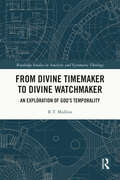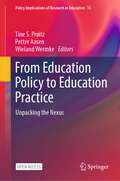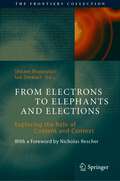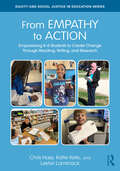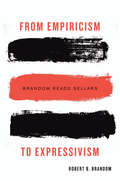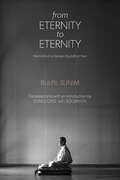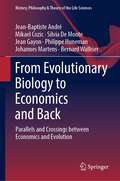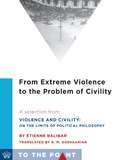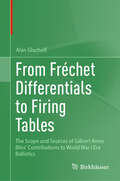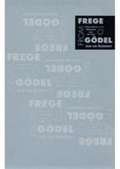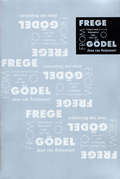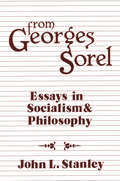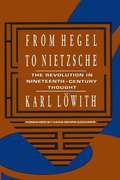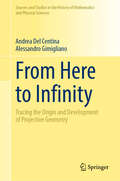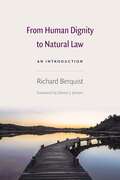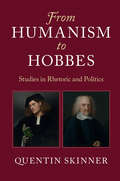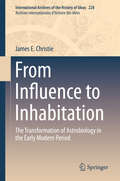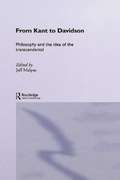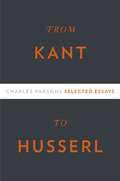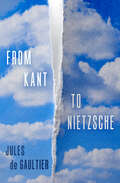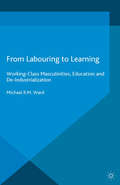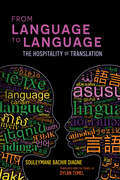- Table View
- List View
From Divine Timemaker to Divine Watchmaker: An Exploration of God’s Temporality (Routledge Studies in Analytic and Systematic Theology)
by R.T. MullinsThis book offers the most extensive exploration of divine temporality to date. It focuses on five main questions. First, what is time? Second, how is God responsible for the existence of time? Third, what does it mean to say that God is temporal? Fourth, what kind of structure might God give to a time series? Fifth, what are the implications for theological doctrines such as the Trinity, creation, providence, and life after death? The author offers a deep, critical engagement with the Christian tradition but also goes beyond to build analytic bridges to Jewish, Islamic, Hindu, and Jainist philosophical theology. The book provides an up-to-date discussion of issues within analytic metaphysics, philosophy of time, and philosophy of religion and draws on the resources of contemporary systematic, historical, and biblical theology.
From Education Policy to Education Practice: Unpacking the Nexus (Policy Implications of Research in Education #15)
by Tine S. Prøitz Wieland Wermke Petter AasenThis open access book addresses the complex interrelations between education policy and education practice developed under new ways of governance. It illuminates the nexuses of the interrelated fields of education policy and education practice including the characteristics of these relationships. The book offers a selection of cases with varied approaches to the question of how different actors and stakeholders are situated in contemporary policy and practice nexuses. The cases presented includes theoretical and conceptual studies; historical studies; ethnographic studies; and studies combining empirical interview data and quantitative data. The book shows what constitutes the contemporary nexuses in education and discusses the need to re-consider how we in education research approach policy and practice in the interface between structure and agency for the future developments in the education policy-practice nexus.
From Electrons to Elephants and Elections: Exploring the Role of Content and Context (The Frontiers Collection)
by Ian Stewart Shyam WuppuluriThis highly interdisciplinary book, covering more than six fields, from philosophy and sciences all the way up to the humanities and with contributions from eminent authors, addresses the interplay between content and context, reductionism and holism and their meeting point: the notion of emergence. Much of today’s science is reductionist (bottom-up); in other words, behaviour on one level is explained by reducing it to components on a lower level. Chemistry is reduced to atoms, ecosystems are explained in terms of DNA and proteins, etc. This approach fails quickly since we can’t cannot extrapolate to the properties of atoms solely from Schrödinger's equation, nor figure out protein folding from an amino acid sequence or obtain the phenotype of an organism from its genotype. An alternative approach to this is holism (top-down). Consider an ecosystem or an organism as a whole: seek patterns on the same scale. Model a galaxy not as 400 billion-point masses (stars) but as an object in its own right with its own properties (spiral, elliptic). Or a hurricane as a structured form of moist air and water vapour. Reductionism is largely about content, whereas holistic models are more attuned to context. Reductionism (content) and holism (context) are not opposing philosophies — in fact, they work best in tandem. Join us on a journey to understand the multifaceted dialectic concerning this duo and how they shape the foundations of sciences and humanities, our thoughts and, the very nature of reality itself.
From Empathy to Action: Empowering K–6 Students to Create Change Through Reading, Writing, and Research (Equity and Social Justice in Education Series)
by Lester Laminack Katie Kelly Chris HassHow can we move children from simply talking about things to learning to take action – and feeling empowered to enact change? This book shows you exactly what this can look like in an elementary class setting. It details the structures and instructional strategies classroom teachers can adopt to help their children create positive outcomes for their communities while also building identities for themselves as real agents of change.Topics include building empathy and compassion, helping students become aware of issues within their communities, creating brave environments so students can engage in productive discussions around sensitive topics, engaging students in research that answers their needs and those of their community, and supporting students into action. Classroom examples, practical tools, and student voices are featured throughout.With this book by your side, you can debunk the false deficit-based assumptions that young people aren’t ready for activism, and you’ll see what is possible when we commit ourselves to integrating civic learning into our classroom literacy instruction.
From Empiricism to Expressivism
by Robert B. BrandomWilfrid Sellars ranks as one of the leading critics of empiricism--a philosophical approach to knowledge that seeks to ground it in human sense experience. Robert Brandom clarifies what Sellars had in mind when he talked about moving analytic philosophy from its Humean to its Kantian phase and why such a move might be of crucial importance today.
From Empiricism to Expressivism: Brandom Reads Sellars
by Robert B. BrandomUnifying and extending Sellars's most important ideas, Robert Brandom constructs a theory of pragmatic expressivism which, in contrast to empiricism, understands meaning and knowledge in terms of the role expressions play in social practices.
From Eternity to Eternity: Memoirs of a Korean Buddhist Nun
by Bulpil SunimFrom Eternity to Eternity is the story of Bulpil Sunim, arguably the most respected female Seon (Zen) master in Korea. Written with candor and an unpretentious sense of humor, her memoir provides both a fascinating record of her life and a deeply accessible window into Buddhist thought and spirituality. Describing and reflecting on her own experience of meditation and her journey as a woman in a male-dominated religious practice, she reveals the largely unknown realities of female monastic life in Korea. She also provides an unprecedented glimpse into her relationship with her father, the legendary Seon Master Seongcheol Sunim, who was widely considered a living Buddha in Korea. This lyrical autobiography, the first of its kind in Korean Buddhist literature, offers readers a chance to learn about Korean Seon meditation and practice from a woman’s perspective and will be of interest not only to scholars of Buddhism but to general readers curious about Buddhism, the experiences of religious women, or simply the remarkable life of a great spiritual leader.
From Evolutionary Biology to Economics and Back: Parallels and Crossings between Economics and Evolution (History, Philosophy and Theory of the Life Sciences #28)
by Philippe Huneman Jean Gayon Bernard Walliser Mikael Cozic Jean-Baptiste André Silvia De Monte Johannes MartensThis book offers a comprehensive exploration of the major key concepts common to economics and evolutionary biology. Written by a group of philosophers of science, biologists and economists, it proposes analyses of the meaning of twenty-five concepts from the viewpoint respectively of economics and of evolutionary biology –each followed by a short synthesis emphasizing major discrepancies and commonalities. This analysis is surrounded by chapters exploring the nature of the analogy that connects evolution and economics, and chapters that summarize the major teachings of the analyses of the keywords. Most scholars in biology and in economics know that their science has something in common with the other one, for instance the notions of competition and resources. Textbooks regularly acknowledge that the two fields share some history – Darwin borrowing from Malthus the insistence on scarcity of resources, and then behavioral ecologists adapting and transforming game theory into evolutionary game theory in the 1980s, while Friedman famously alluded to a Darwinian process yielding the extant firms. However, the real extent of the similarities, the reasons why they are so close, and the limits and even the nature of the analogy connecting economics and biological evolution, remain inexplicit. This book proposes basis analyses that can sustain such explication. It is intended for researchers, grad students and master students in evolutionary and in economics, as well as in philosophy of science.
From Extreme Violence to the Problem of Civility: A Selection from Violence and Civility: On the Limits of Political Philosophy
by Étienne BalibarIn this impassioned argument, Étienne Balibar boldly confronts the insidious causes of violence, racism, nationalism, and ethnic cleansing worldwide. Through a novel synthesis of theory and empirical studies of violence drawn from contemporary life, Balibar tests the limits of political philosophy to formulate new, productive conceptions of war, revolution, sovereignty, and class. Balibar explores how the relationship between politics and violence effects the way violence continues to exist in our society, and further how "civility" presents itself within this contemporary dichotomy. Balibar introduces the need to view politics as "counter-violence" versus "anti-violence" and other conversions in power and authority to better aptly respond to cruelty and violence.
From Extreme Violence to the Problem of Civility: On the Limits of Political Philosophy
by Étienne BalibarIn this impassioned argument, Étienne Balibar boldly confronts the insidious causes of violence, racism, nationalism, and ethnic cleansing worldwide. Through a novel synthesis of theory and empirical studies of violence drawn from contemporary life, Balibar tests the limits of political philosophy to formulate new, productive conceptions of war, revolution, sovereignty, and class. Balibar explores how the relationship between politics and violence effects the way violence continues to exist in our society, and further how "civility" presents itself within this contemporary dichotomy. Balibar introduces the need to view politics as "counter-violence" versus "anti-violence" and other conversions in power and authority to better aptly respond to cruelty and violence.
From Frechet Differentials to Firing Tables: The Scope and Sources of Gilbert Ames Bliss' Contributions to World War I Era Ballistics
by Alan GluchoffThis monograph explores the history of the contribution to ballistics by the American mathematician Gilbert Ames Bliss during World War I. Drawing on the then-evolving calculus of variations, Bliss pioneered a novel technique for solving the problem of differential variations in ballistic trajectory. Called Bliss’ adjoint method, this technique was both hailed and criticized at the time: it was seen as both a triumphant application of pure mathematics to an applied problem and as a complex intrusion of higher mathematics into the jobs of military personnel not particularly interested in these matters. Although he received much praise immediately after the War, the details of Bliss’ work, its furthering of pure mathematical thought, and its absorption into mainstream ballistic work and instruction have never been adequately examined. Gluchoff explores the mathematics of Bliss’ work and the strands from which his technique was developed. He then documents the efforts to make the adjoint method accessible to military officers and the conflicts that emerged as a result both between mathematicians and officers and among mathematicians themselves. The eventual absorption of the adjoint method into range firing table construction is considered by looking at later technical books which incorporate it, and, finally, its influence on the ongoing development of functional calculus is detailed. From Frechet Differentials to Firing Tables will appeal to historians of mathematics, physics, engineering, and warfare, as well as current researchers, professors, and students in these areas.
From Frege to Godel: A Source Book in Mathematical Logic, 1879-1931
by Jean Van HeijenoortThe fundamental texts of the great classical period in modern logic, some of them never before available in English translation, are here gathered together for the first time. Modern logic, heralded by Leibniz, may be said to have been initiated by Boole, De Morgan, and Jevons, but it was the publication in 1879 of Gottlob Frege’s Begriffsschrift that opened a great epoch in the history of logic by presenting, in full-fledged form, the propositional calculus and quantification theory. <p><p> Frege’s book, translated in its entirety, begins the present volume. The emergence of two new fields, set theory and foundations of mathematics, on the borders of logic, mathematics, and philosophy, is depicted by the texts that follow. Peano and Dedekind illustrate the trend that led to Principia Mathematica. Burali-Forti, Cantor, Russell, Richard, and König mark the appearance of the modern paradoxes. Hilbert, Russell, and Zermelo show various ways of overcoming these paradoxes and initiate, respectively, proof theory, the theory of types, and axiomatic set theory. Skolem generalizes Löwenheim’s theorem, and he and Fraenkel amend Zermelo’s axiomatization of set theory, while von Neumann offers a somewhat different system. The controversy between Hubert and Brouwer during the twenties is presented in papers of theirs and in others by Weyl, Bernays, Ackermann, and Kolmogorov. The volume concludes with papers by Herbrand and by Gödel, including the latter’s famous incompleteness paper. <p> Of the forty-five contributions here collected all but five are presented in extenso. Those not originally written in English have been translated with exemplary care and exactness; the translators are themselves mathematical logicians as well as skilled interpreters of sometimes obscure texts. Each paper is introduced by a note that sets it in perspective, explains its importance, and points out difficulties in interpretation. Editorial comments and footnotes are interpolated where needed, and an extensive bibliography is included.
From Frege to Gödel: A Source Book in Mathematical Logic, 1879-1931
by Jean van HeijenoortThe fundamental texts of the great classical period in modern logic, some of them never before available in English translation, are here gathered together for the first time. Modern logic, heralded by Leibniz, may be said to have been initiated by Boole, De Morgan, and Jevons, but it was the publication in 1879 of Gottlob Frege’s Begriffsschrift that opened a great epoch in the history of logic by presenting, in full-fledged form, the propositional calculus and quantification theory. Frege’s book, translated in its entirety, begins the present volume. The emergence of two new fields, set theory and foundations of mathematics, on the borders of logic, mathematics, and philosophy, is depicted by the texts that follow. Peano and Dedekind illustrate the trend that led to Principia Mathematica. Burali-Forti, Cantor, Russell, Richard, and König mark the appearance of the modern paradoxes. Hilbert, Russell, and Zermelo show various ways of overcoming these paradoxes and initiate, respectively, proof theory, the theory of types, and axiomatic set theory. Skolem generalizes Löwenheim’s theorem, and he and Fraenkel amend Zermelo’s axiomatization of set theory, while von Neumann offers a somewhat different system. The controversy between Hubert and Brouwer during the twenties is presented in papers of theirs and in others by Weyl, Bernays, Ackermann, and Kolmogorov. The volume concludes with papers by Herbrand and by Gödel, including the latter’s famous incompleteness paper. Of the forty-five contributions here collected all but five are presented in extenso. Those not originally written in English have been translated with exemplary care and exactness; the translators are themselves mathematical logicians as well as skilled interpreters of sometimes obscure texts. Each paper is introduced by a note that sets it in perspective, explains its importance, and points out difficulties in interpretation. Editorial comments and footnotes are interpolated where needed, and an extensive bibliography is included.
From GDP to Sustainable Wellbeing: Changing Statistics or Changing Lives? (Wellbeing in Politics and Policy)
by David J. Hand Paul AllinThis book is about the function and use of official statistics. It welcomes the aspiration for official statistics to be an indispensable element in the information system of a democratic society, serving the government, the economy and the public with data about the economic, demographic, social and environmental situation. The book identifies the political role of official statisticians, who decided what gets measured as well as how it is measured. While thousands of official statistics are published every year, and some are quoted by politicians, used by policy-makers or reported in the media, the authors observe that, in the main, official statistics do not feature much in everyday lives of people and businesses. The book concludes with suggestions for more that should be done, especially in the context of improving wellbeing and helping meet the worldwide set of sustainable development goals set for 2030.
From Georges Sorel: Essays in Socialism and Philosophy
by Georges SorelThe prophet of social decadence, the theorist of violence and advocate of the general strike, the critic who stood Marx on his head, Georges Sorel was one of the foremost writers of this century to write extensively on the great importance of the moral aspects of social movements. His reconstruction of socialist ethics established him as one of the most remarkable critics of Marxist thought, and his writings in many aspects anticipated contemporary interpretations.From Georges Sorel, the first of two volumes of Sorel's work, presents his major contributions to social thought articles on Marxism, religion, syndicalism, social myths, the philosophy of history and science, as well as a large and newly translated segment of "Reflections on Violence." In his introduction, John Stanley disputes the frequently encountered view of Sorel as a reactionary or extreme rightist, and emphasizes Sorel's attempt to provide Western society with a morality based on labor, struggle, and family life.
From Hegel to Nietzsche: The Revolution in Nineteenth-Century Thought
by David E. Green Karl LowithBeginning with an examination of the relationship between Hegel and Goethe, Lowith discusses how Hegel's students, particularly Marx and Kierkegaard, interpreted----or reinterpreted----their master's thought, and proceeds with an in-depth assessment of the other important philosophers, from Feuerbach, Stirner, and Schelling to Nietzsche.
From Here to Infinity: Tracing the Origin and Development of Projective Geometry (Sources and Studies in the History of Mathematics and Physical Sciences)
by Andrea Del Centina Alessandro GimiglianoThis monograph traces the development of projective geometry from its Greek origins to the early 20th century. It covers Renaissance perspective studies and insights from the late sixteenth to seventeenth centuries, examining the contributions of Desargues and Pascal. Most of the book is devoted to the evolution of the subject in the 19th century, from Carnot to von Staudt. In particular, the book offers an unusually thorough appreciation of Brianchon's work, a detailed study of Poncelet's innovations, and a remarkable account of the contributions of Möbius and Plücker. It also addresses the difficult question of the historical relationship between synthetic and analytic points of view in geometry, analyzing the work of prominent synthetic geometers Steiner, Chasles, and von Staudt in detail. The book concludes around 1930, after the synthetic point of view was axiomatized and the analytic point of view became intertwined with algebraic geometry. Balancing historical analysis with technical precision and providing deep insights into the evolution of the mathematics, this richly illustrated book serves as a central reference on the history of projective geometry.
From Human Dignity To Natural Law: An Introduction
by Richard Berquist Steven J. JensenFrom Human Dignity to Natural Law shows how the whole of the natural law, as understood in the Aristotelian Thomistic tradition, is contained implicitly in human dignity. Human dignity means existing for one's own good (the common good as well as one's individual good), and not as a mere means to an alien good. But what is the true human good? This question is answered with a careful analysis of Aristotle's definition of happiness. The natural law can then be understood as the precepts that guide us in achieving happiness. To show that human dignity is a reality in the nature of things and not a mere human invention, it is necessary to show that human beings exist by nature for the achievement of the properly human good in which happiness is found. This implies finality in nature. Since contemporary natural science does not recognize final causality, the book explains why living things, as least, must exist for a purpose and why the scientific method, as currently understood, is not able to deal with this question. These reflections will also enable us to respond to a common criticism of natural law theory: that it attempts to derive statements of what ought to be from statements about what is.
From Humanism to Hobbes: Studies in Rhetoric and Politics
by Quentin SkinnerThe aim of this collection is to illustrate the pervasive influence of humanist rhetoric on early-modern literature and philosophy. The first half of the book focuses on the classical rules of judicial rhetoric. One chapter considers the place of these rules in Shakespeare's The Merchant of Venice, while two others concentrate on the technique of rhetorical redescription, pointing to its use in Machiavelli's The Prince as well as in several of Shakespeare's plays, notably Coriolanus. The second half of the book examines the humanist background to the philosophy of Thomas Hobbes. A major new essay discusses his typically humanist preoccupation with the visual presentation of his political ideas, while other chapters explore the rhetorical sources of his theory of persons and personation, thereby offering new insights into his views about citizenship, political representation, rights and obligations and the concept of the state.
From Influence to Inhabitation: The Transformation of Astrobiology in the Early Modern Period (International Archives of the History of Ideas Archives internationales d'histoire des idées #228)
by James E. ChristieThis book describes how and why the early modern period witnessed the marginalisation of astrology in Western natural philosophy, and the re-adoption of the cosmological view of the existence of a plurality of worlds in the universe, allowing the possibility of extraterrestrial life. Founded in the mid-1990s, the discipline of astrobiology combines the search for extraterrestrial life with the study of terrestrial biology – especially its origins, its evolution and its presence in extreme environments. This book offers a history of astrobiology's attempts to understand the nature of life in a larger cosmological context. Specifically, it describes the shift of early modern cosmology from a paradigm of celestial influence to one of celestial inhabitation. Although these trends are regarded as consequences of Copernican cosmology, and hallmarks of a modern world view, they are usually addressed separately in the historical literature. Unlike others, this book takes a broad approach that examines the relationship of the two. From Influence to Inhabitation will benefit both historians of astrology and historians of the extraterrestrial life debate, an audience which includes researchers and advanced students studying the history and philosophy of astrobiology. It will also appeal to historians of natural philosophy, science, astronomy and theology in the early modern period.
From Kant to Davidson: Philosophy and the Idea of the Transcendental (Routledge Studies in Twentieth-Century Philosophy)
by Jeff MalpasRecent philosophy has seen the idea of the transcendental, first introduced in its modern form in the work of Kant, take on a new prominence.Bringing together an international range of younger philosophers and established thinkers, this volume opens up the idea of the transcendental, examining it not merely as a mode of argument, but as naming a particular problematic and a philosophical style.With contributions engaging with both analytic and continental approaches, this book will be of essential interest to philosophers and philosophy students interested in the idea of the transcendental and the part that it plays in modern and contemporary philosophy.
From Kant to Husserl
by Charles ParsonsIn From Kant to Husserl, Charles Parsons examines a wide range of historical opinion on philosophical questions, from mathematics to phenomenology. Amplifying his early ideas on Kant’s philosophy of arithmetic, Parsons uses Kant’s lectures on metaphysics to explore how his arithmetical concepts relate to the categories. He then turns to early reactions by two immediate successors of Kant, Johann Schultz and Bernard Bolzano, to shed light on disputed questions regarding interpretation of Kant’s philosophy of mathematics. Interested, as well, in what Kant meant by pure natural science, Parsons considers the relationship between the first Critique and the Metaphysical Foundations of Natural Science. His commentary on Kant’s Transcendental Aesthetic departs from mathematics to engage the vexed question of what it tells about the meaning of Kant’s transcendental idealism. Proceeding on to phenomenology, Parsons examines Frege’s evolving idea of extensions, his attitude toward set theory, and his correspondence, particularly exchanges with Russell and Husserl. An essay on Brentano brings out, in the case of judgment, an alternative to the now standard Fregean view of negation, and, on truth, alternatives to the traditional correspondence view that are still discussed today. Ending with the question of why Husserl did not take the linguistic turn, a final essay included here marks the only article-length discussion of Husserl Parsons has ever written, despite a long-standing engagement with this philosopher.
From Kant to Nietzsche
by Jules de Gaultier&“Schopenhauer contributed the concept of the will-to-live; Nietzsche that of the will-to-power; and de Gaultier that of the will-to-illusion.&” —Wilmot E. Ellis Can you construct your own reality? What if you don&’t trust your senses, but you want to live a happy, productive life? How should you make moral decisions? What do you believe to be true? Do you believe in a supreme being? How do you decide your moral compass? This work by the author of Le Bovarysme treats the tendency to think of things other than they are as a living source of art. Jules de Gaultier sees this sort of behavior not as a moral or ethical problem, but an aesthetic problem. His metaphysical position has a long and complicated history which can be traced back to the philosophical musings of Kant, Schopenhauer, and Nietzsche. This book was his first published work, and serves as a thought-provoking introduction to his philosophy.
From Labouring to Learning: Working-Class Masculinities, Education and De-Industrialization (Palgrave Studies in Gender and Education)
by Michael R.M. WardHighly Commended in the Society of Educational Studies Book PrizeThis book explores how economic changes and the growing importance of educational qualifications in a shrinking labour market, particularly effects marginalized young men. It follows a group of young working-class men in a de-industrial community and challenges commonly held representations that often appear in the media and in policy discourses which portray them as feckless, out of control, educational failures and lacking aspiration. Ward argues that for a group of young men in a community of social and economic deprivation, expectations and transitions to adulthood are framed through the industrial legacy of geographically and historically shaped class and gender codes. These codes have an impact on what it means to be a man and what behaviour is deemed acceptable and what is not.
From Language to Language: The Hospitality of Translation
by Souleymane Bachir DiagneIn this engaging humanist text, a renowned Senegalese philosopher explores the power of translation to bridge cultural divides.Informed by his own multicultural background—African, French, and American—Souleymane Bachir Diagne interrogates the practice of translation in this thoughtful text. Although translation often produces a relationship of profound inequality between dominant and dominated languages, it can also be a source of dialogue and exchange, including in situations of asymmetry, particularly regarding colonialism, where the interpreter becomes a true cultural mediator.To praise translation, &“the language of languages,&” is to celebrate its plurality and equality, because to translate is to give hospitality in one language to what has been thought in another. It is to create reciprocity, a shared sense of humanity, and to imagine a positive version of the Tower of Babel.
